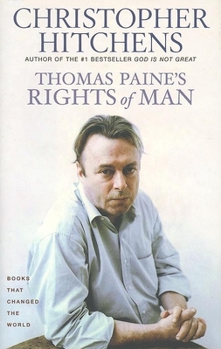Thomas Paine's Rights of Man
(Part of the Books That Shook the World Series and Books That Changed the World Series)
Select Format
Select Condition 
Book Overview
Thomas Paine was one of the greatest advocates of freedom in history, and his Declaration of the Rights of Man , first published in 1791, is the key to his reputation. Inspired by his outrage at Edmund Burke's attack on the French Revolution, Paine's text is a passionate defense of man's inalienable rights. Since its publication, Rights of Man has been celebrated, criticized, maligned, suppressed, and co-opted. But in Thomas Paine's Rights of Man , the polemicist and commentator Christopher Hitchens, "at his characteristically incisive best," marvels at its forethought and revels in its contentiousness ( The Times , London). Hitchens is a political descendant of the great pamphleteer, "a Tom Paine for our troubled times." ( The Independent , London) In this "engaging account of Paine's life and times [that is] well worth reading" he demonstrates how Paine's book forms the philosophical cornerstone of the United States, and how, "in a time when both rights and reason are under attack," Thomas Paine's life and writing "will always be part of the arsenal on which we shall need to depend." ( New Statesman )
Format:Hardcover
Language:English
ISBN:0871139553
ISBN13:9780871139559
Release Date:July 2007
Publisher:Atlantic Monthly Press
Length:160 Pages
Weight:0.63 lbs.
Dimensions:0.7" x 5.0" x 7.8"














